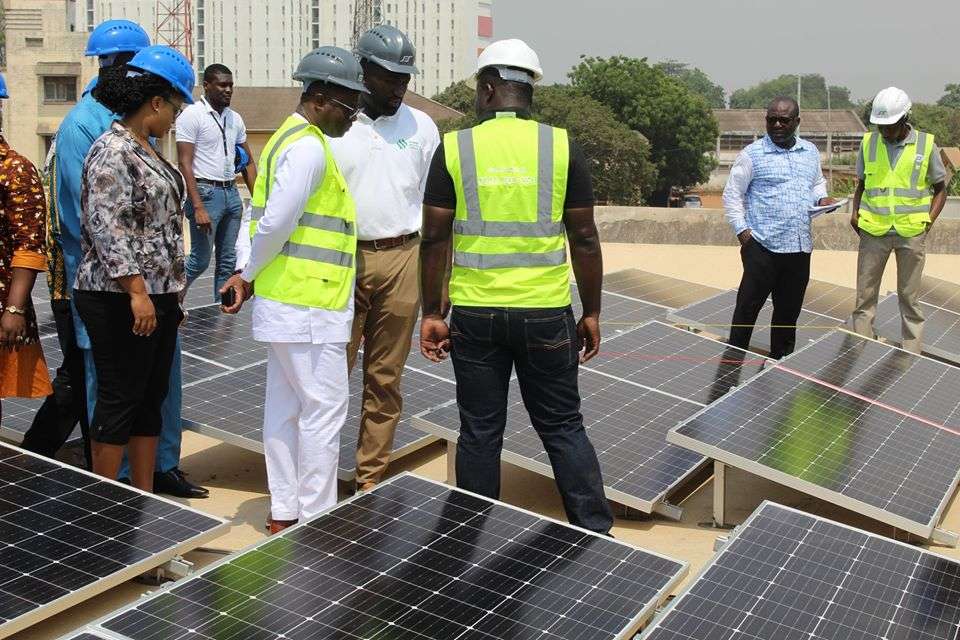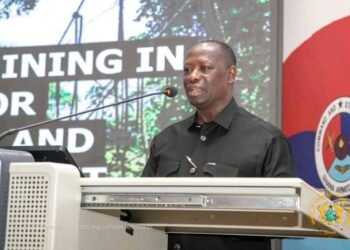The Bulk Oil Storage and Transportation Company (BOST) has announced the implementation of solar power systems across its major fuel depots, in a bold step toward reshaping its energy footprint.
This move, according to company leadership, marks a critical pivot in Ghana’s push for a low-carbon economy and mirrors the country’s long-term climate strategy.
BOST Managing Director Afetsi Awoonor described the transition as a strategic economic and environmental decision.
“Energy is one of BOST’s biggest expenses, and with diesel prices still above GH¢12 per litre, the shift to solar is smart economics.”
Afetsi Awoonor, BOST Managing Director
He emphasized that beyond reducing operational expenses, the company sees an opportunity to tap into Ghana’s emerging carbon credit market, potentially turning its sustainability drive into a new revenue stream.
The initiative forms part of a broader energy transition strategy rooted in Ghana’s national Energy Transition Framework, which aims to cut greenhouse gas emissions by 10% by 2030 and achieve net-zero status by 2070.

By transitioning from diesel-powered systems to solar energy at its major depots, BOST is positioning itself not only as a key player in Ghana’s fuel logistics but also as a trailblazer in sustainable energy innovation.
“Each solar-powered depot contributes to the national emission-reduction target, reinforcing BOST’s role in the country’s sustainable energy future.
“This marks a deliberate commitment to lowering emissions, reducing energy costs, and aligning BOST’s operations with Ghana’s long-term energy agenda.”
Afetsi Awoonor, BOST Managing Director
The company has already begun solar panel installations at its Buipe and Kumasi depots, with Tema slated as the next site in the rollout.
These solar systems are being designed to power critical operations, including fuel pumps, lighting systems, and security monitoring equipment, areas that have historically relied on diesel-powered generators.
BOST Drives Solar Shift

To manage this transition effectively, BOST has created a dedicated Green Transition and Alternative Fuels Department.
The department’s mandate includes not only the current solar integration but also broader initiatives that will eventually involve research into clean fuels, sustainability reporting, and carbon market participation.
This shift by BOST reflects a growing national consensus around the urgent need to diversify Ghana’s energy sources. That consensus has recently gained further institutional backing with the establishment of the Ministry of Energy and Green Transition.
Spearheaded by Minister John Abdulai Jinapor under President John Dramani Mahama’s administration, the new ministry is working alongside the Climate Change and Sustainability Secretariat to promote cross-sector collaboration, policy reform, and investment in climate-resilient infrastructure.
Within this national framework, BOST’s solar initiative stands as a proof point—evidence that key state-owned enterprises are moving beyond rhetoric and taking practical steps toward decarbonisation.
Still, the journey is not without its challenges. Integrating solar into industrial systems requires not only financial investment but also technical expertise.

There are concerns about maintenance, storage capacity, and the durability of systems under Ghana’s climate conditions. Yet BOST remains undeterred.
“This transition is not about abandoning oil overnight.
“It’s about staying relevant in a world that is moving forward, toward cleaner, smarter energy.”
Afetsi Awoonor, BOST Managing Director
His statement underscores a pragmatic vision for the future—one that sees oil continuing to play a role in Ghana’s energy mix, but within a broader and more sustainable framework.
BOST’s proactive posture could set a precedent for other state-owned enterprises and private firms alike, especially as the race for climate financing intensifies across Africa.
Institutions that take early, tangible steps toward green transformation are likely to attract greater investor confidence and unlock new funding opportunities through global carbon markets and climate funds.
As Ghana navigates the complexities of energy transition in the coming decades, initiatives like BOST’s depot solarisation may prove to be more than just a cost-saving measure—they may be the foundation upon which Ghana builds a cleaner, more resilient energy future.
READ ALSO: IMF Urges BoG to Hold Tight on Policy Rate to Cement Disinflation Gains



















